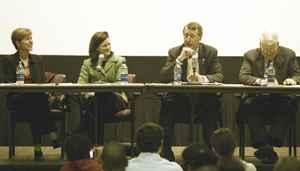The Negro national anthem is sung amongst a panel of high-ranking state officials, students, faculty and members of the community alike. Some know it by heart and sing it loudly; others move their lips in slight recognition.
The majority, however, stand in respect and uncomfortably shift from side to side. But a common interest brought them all together Wednesday when the N.C. State chapter of the NAACP held its first in a series of leadership development programs.
“I’m looking forward to this semester, getting students politically involved. A lot of blood, sweat and tears have been shed so that we can go out into the ballot box and vote,” President Locke Whiteside said.
Congressman Bob Etheridge and David Price, Representative Deborah Ross and Senator Janet Cowell represent students’ interests when it comes to student loan cuts, the onset of the lottery and the achievement gap amongst black and white K-12 students.
“I have a personal commitment to keep your tuition as low as possible. But everyone needs to be more vigilant about how the lottery money is going to be used.” Ross said. “It should be used for education, but it’s not guaranteed.”
With the establishment of a North Carolina lottery, student loan concerns for the poorest could be abolished.
“The good thing about having the lottery is that it helps low income families fund college tuition. Up to $4,000 a year can be given per student based on the income of their family,” she said.
Ross also commented on the rising test scores in Wake County for K-12 students.
“Test scores are up. What’s great is 90 percent of K-12 are passing end-of-grade tests. What we need help from you on is our African-American children are not doing 90 percent,” she said. “They are not doing as well as white, Asian and Latino.” “Fifty percent of African-American males are not graduating from high school. We need to work harder to reach each and every child,” Ross said.
Perhaps even a more shocking statistic is the fact that 86 percent of NCSU students can claim these same schools as their alma mater.
Ross is not the only one who brought her convictions to the panel.
Etheridge gave a rallying cry on how to close in on this large achievement gap and how to accomplish Ross’ goal.
“Let me challenge every single one of you to be a mentor to a youngster. If you think you got here alone, pinch yourself. You’re wrong. Someone helped you. Always remember you have something to give back,” he said. “Education is one thing that levels the playing field for everyone regardless of their ethnicity.”
To make sure that education is a top priority, “it’s important for students to be informed on the issues, especially when there are changes being made that harm and affect [them],” Whiteside said.
One of those changes is the voting rights act that “stands as one of the great legislative pieces of our history” Etheridge said.
“Anytime you have good legislation, you have all parties working together, and that is what the NAACP is all about; shining a light on injustices, whether it be in education, housing or the workplace, and you really can’t hide from the light,” Etheridge said.
Price pointed to the voting rights act as an extension of the 15th amendment, which was renewed for 25 years in 1982.
“This year will be the year to renew the Voting Rights Act,” he said. “There are some people urging that it not be renewed — that it is obsolete. But discriminatory practices still exist.”
Price urged members of the higher education community, including students, to be more vocal about matters that are important to them.
The outlook of education costs, the startling achievement gap between our younger black and white students, and the renewal of the voting rights act are all issues in which you can get involved.
“I’m really excited about the future of the UNC system, and all things we have in front of us. We have a great future,” Cowell said.
The next series in the leadership program hosted by the state chapter of the NAACP will be held on Jan. 25 at 7 p.m. in Witherspoon Student Center and will include guest speaker Congressman Brad Miller.








